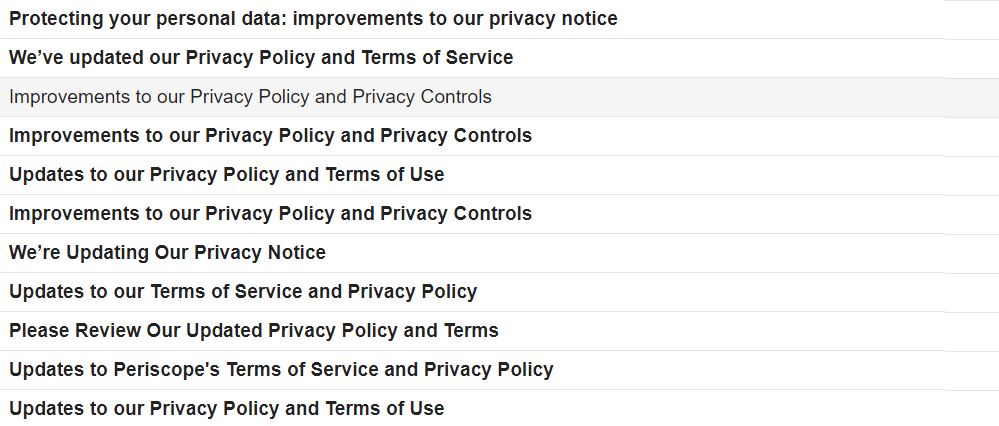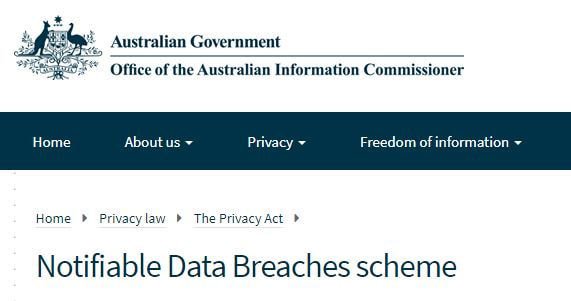Some are from brands and organisations you are familiar with, and more interestingly, some are from ones that you can’t remember or even know.
Well, ALL of them have your details- and that’s exactly the point of this whole situation. Every organisation is acting now in response to two significant updates that you may or may not be aware of (but should be):
- Domestically, this is due to Australia’s Notifiable Data Breaches Scheme (NDBS).
- Internationally, this is because of Europe’s General Data Protection Regulation (GDPR)
Both of these have come into effect this year, and whether you are coming from a business or an individual perspective, you need to know all about them and what they mean for you.
Why? Because it provides organisations with information about their customers and the market, and allows them to direct Marketing campaigns toward meeting their needs.
While data collection and statistical analysis have been around for decades, it was far more general in the past. For example, Market researchers would conduct focus groups and analyse purchasing trends to predict cycles and patterns and make strategic decisions accordingly.
It was very top-line and many assumptions had to be made for the data to be useful.
However, the digital revolution and social media changed all of this and stepped it up a major gear.
People only used to provide their personal information in select situations and only to very specific organisations like the Government or their Bank.
Now, data collection is far more liberal and in-depth. Customers willingly provide more specific details like their browsing history, dates, buying behaviours, employment records and even their names and addresses to any business in exchange for some sort of value. In fact, people have become so desensitised to doing this, that giving your data out has become the norm.
We all know how Facebook works by now, right?
It’s common today for companies to provide a service for “free” (well, there isn’t a monetary charge anyway), in exchange for precious data that they can use or a grand scale to analyse customer behaviour in a far more precise way than ever before. These insights are extremely valuable because they help inform more profitable strategies.
But it’s not all doom and fear!
Data collection at this level has given rise to highly effective Content Marketing practises today.
Content Marketing is designed to offer people genuinely useful pieces of media content, such as blogs, videos, articles, podcasts and so on that answer customer questions and deliver value for them, on their terms.
Where traditional marketing has always been about interruption and forced viewing, such as direct advertising on TV, newspapers and radio, Content Marketing is about encouraging and nurturing on-going relationships between a business and a customer, but this can only be achieved when a customer’s details are all known.
Simple. The more details a business has, the better they can understand and interpret an individual’s needs and then deliver them highly tailored solutions in the form of products and services.
Marketers have discovered that our audiences today ignore mass-messages that they just don’t care about. So instead, businesses collect information from segments, combine it together to learn what each customer really wants, and adapts to that.
This has created a positive business environment where the customer is the central focus, and products are adapted to them, rather than traditionally, where customers were adapted to products.
How can a business effectively use data?
For example, a person who visits a brand’s website starts off as completely unknown.
However, this business may offer free content, such as a newsletter or catalogue, that piques their interest as something they may want to receive for their benefit.
This customer provides their details in exchange for the weekly newsletter, and now, they receive useful information on a regular basis compiled by the business, and in turn, the business now knows more about who is interested in what they do. The business can then use that information to keep in touch and provide them with ‘how-to’ videos or discounts based on what parts of the newsletter the customer opens every week.
The intention behind Content Marketing is mutual benefit for mutual gain, and this is done through the exchange of data for value.
However, we all do need to be careful
In saying that, there is always a need to be cautious as to who or where you are providing your personal details.
Generally, most commercial use of customer data is actually quite innocent, meaning that they are simply using the insights gathered to research how better to serve your needs in an anonymous way. Now, regardless of how you view that concept, organisations who collect and store data have an obligation to protect it and keep it safe.
If it was to be leaked, it would be a harmful breach of a customer’s trust and could put them at serious risk.
This is where Government bodies have stepped in, to make Data Protection Policies more rigid and official, while holding all parties legally accountable.
Here are the two updates that you must be aware of.
The Australian Federal NDB (Notifiable Data Breaches) scheme came into effect as of February 2018 and it is compulsory for all businesses which collect and hold sensitive customer data in any form, for any use, subject to the Australian Privacy Act 1988 (Cth).
This means that this mandatory Government initiative affects a majority of businesses, and it’s their responsibility to be aware of what this means for their operations. Ignorance is never a legal defence, after all.
As mentioned above, there is a common trend of capturing and collecting information for a wide range of reasons and the NDB is designed to increase the protection offered to individuals from their personal details being leaked or accessed illegally.
What is the NDB Scheme?
In summary, if a business experiences a data breach which is likely to put customers at risk of serious harm, then the Australian NDB scheme states that it is immediately compulsory for that business to publically notify everyone involved and recommend a course of action on how they can minimise their risk or remedy their situation.
This would be an absolute PR disaster for any business, not to mention a costly exercise.
In addition, failure to comply will result in serious fines.
What should businesses do?
As a business, prevention is better than cure.
So, tighten up your Privacy Policies and Standard Operating Procedures when it comes to data collection, handling and storage. You should also train your internal teams to ensure that they’re adhering to these rules.
Next, check that your cybersecurity is all up-to-date and effective.
From a Marketing perspective, you may want to pre-prepare a Communication Action Plan in advance, so that if any breach was to ever occur, you’re ready to respond immediately, rather than be caught off-guard and act in a panic.
You need more information!
Remember, I have greatly summarised this NDB scheme.
Please visit the Australian Government’s Notifiable Data Breaches Scheme website here, for all of the information you need to know and how to update your practises to be compliant.
Remember, it’s up to your business to research more about what you need to do to protect both yourself and your customers.
The European Union (EU) have put in place the General Data Protection Regulation (or GDPR), which became effective as of May 2018.
Similar to Australia’s NDB Scheme, it is designed to consolidate data privacy laws across Europe to protect data privacy, and to officially address the way organisations across the region approach data privacy.
All organisations that interact with EU consumers or employees, whether they are within the EU or not, will still have to comply or risk running into hefty fines. This means that, while Australian organisations may not be in physically in Europe, if you have any access to people within the EU, you are still subject to the GDPR.
Just like the Australian NDB Scheme, it’s important to read more about the EU’s GDPR to see how it affects your business, and what steps you need to take to remain compliant.
You can read more about Australian businesses and the EU General Data Protection Regulation here.
I hope this information was useful!
Don’t wait until it’s too late. Do your research and get compliant today.
Thanks,
Christopher
At Melotti Media, we understand that high quality copywriting is essential for business success, but it is easier said than done. You’re time poor and spread thin, and writing isn’t your expertise. So, focus on what really matters, while we take care of all of your copywriting and marketing needs!
If you need further clarification about content, or if you need a quality copywriter to get the results you need, contact me now at chris@melottimedia.com.au. Or leave a comment, below.
I can sharpen your words to achieve your goals, today!
Christopher Melotti
Melotti Media Copywriting and Marketing Solutions
www.melottimedia.com.au
Click here to view the Copywriting FAQ page for all you need to know











